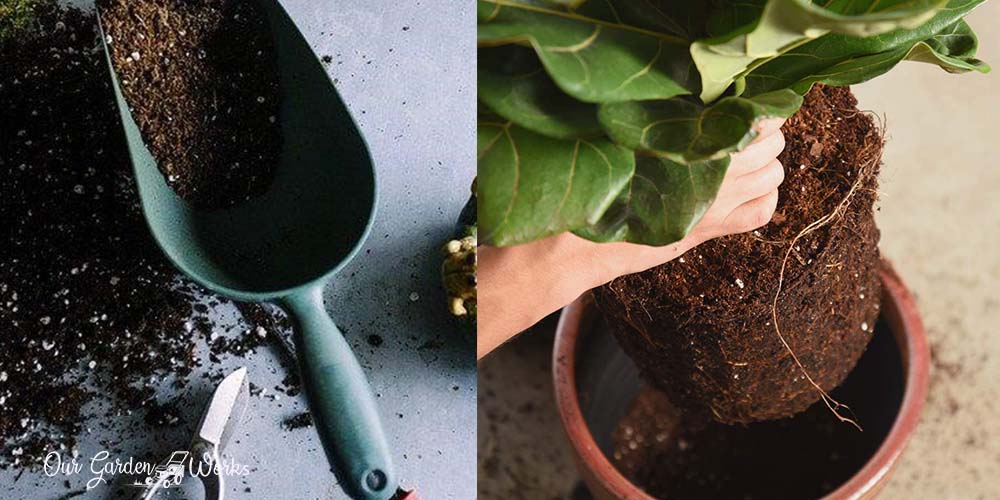Fiddle leaf figs are popular indoor trees that are notorious for being sensitive and hard to grow. Good quality of soil is among the contributing factors in keeping them healthy and thriving.
The best soil for fiddle figs is well-draining and a bit drier rather than moist. Ficus varieties are very particular for their hate on wet feet or roots.
Potted fiddle leaf figs need to have aerated and fast-draining soil to keep it at an adequate moisture level that ficus varieties need.
In this post, we listed three categories of potting soil that are perfect for fiddle leaf figs
(You could use the table of contents below to jump to the sections that are most important to you.)
Best Soil For Fiddle Leaf Fig: Options and Alternatives
While there are specific brands of potting soil made for fiddle leaf figs, potting soil of other plant varieties may also provide a good soil environment for ficus varieties.
So, we divided our list into 3 categories, so you can have ideas on how to find the best soil for your fiddle leaf fig.
A. Cactus & Succulent Potting Mix
Soil for cactus and succulents are made of porous and pebbly materials that help aerate the soil.
It also contains organic materials that help retain enough moisture for the roots to consume without causing root rot. Its attribute is well-suited for ficus varieties that are sensitive to overfertilization and overwatering.
If you have a collection of succulents and cacti at home, you can save a lot of money by buying the same potting mix for your fiddle leaf fig.
Here are some of the best ones in the market:
1. The Next Gardener Organic Succulent and Cactus Potting Soil
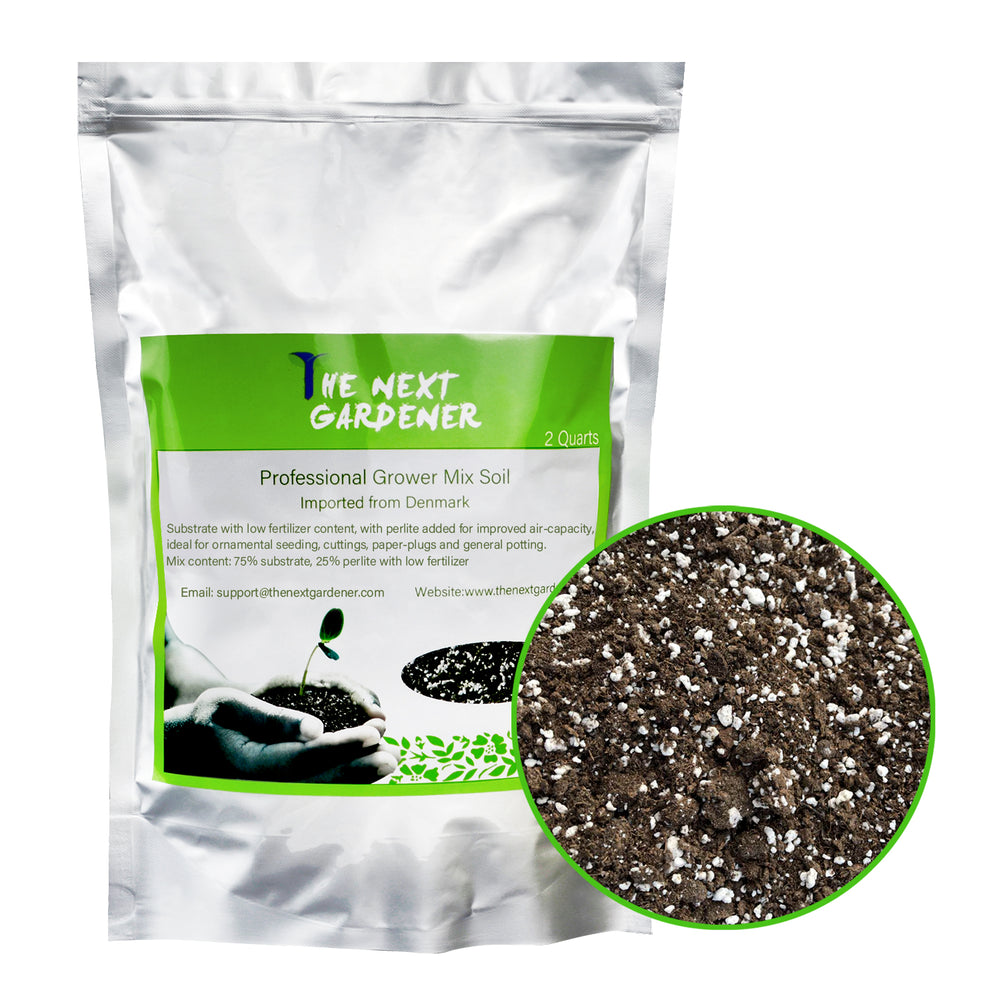
The Next Gardener Organic Succulent and Cactus Potting Soil are one of the best soils for fiddle leaf figs since it is made of 75% substrate (soil), 25% perlite, and low-grade fertilizer.
It is a well-aerated soil that is perfect for:
- Bonsai succulent
- Cactus
- Monstera (Donkey’s tail)
- Crassula ovata jade
- Ficus varieties
- Other indoor plants
This potting soil is lightweight, aerated, and well-draining. It has a pH level of 5.5 which is suitable for fiddle leaf figs. Its soil composition is suitable for gardeners who often have overwatering issues or often encounter root rot with their plants.
Most gardeners love the consistency of this potting mix because when it is wet it will still feel bouncy and not dripping wet. It retains enough moisture to keep the roots hydrated but not soaked in water.
However, it contains fertilizer so refrain from adding another fertilizer for a month or two to prevent overfertilizing your newly potted fiddle leaf fig.
Pros
- Fast-draining
- Retains moisture but keeps the soil light and bouncy
- Prevents overwatering and root rot
- Good pH level for fiddle leaf fig
- Contains fertilizer
Cons
- The label does not mention the type of substrate it uses.
- The fertilizer NPK ratio is also not mentioned by the manufacturer.
2. Miracle-Gro Cactus, Palm & Citrus Potting Mix
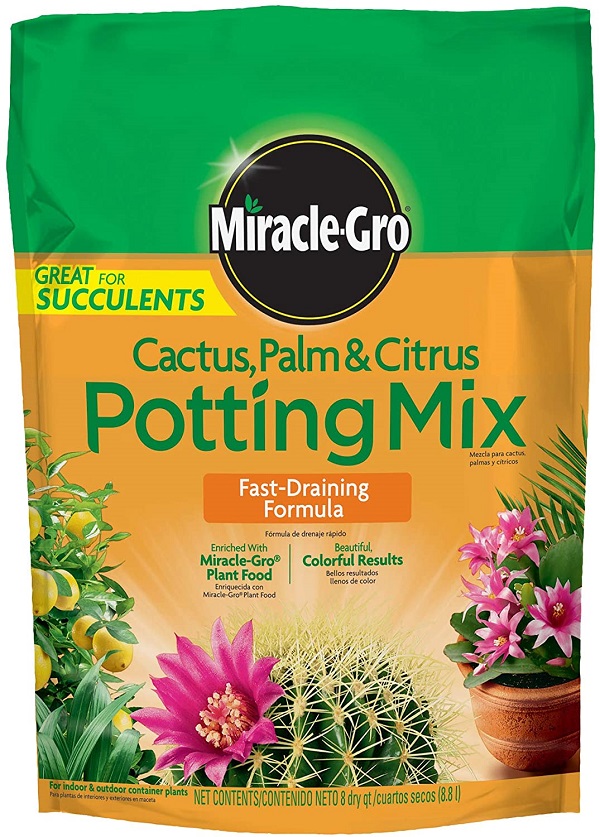
Another popular potting mix is Miracle-Gro Cactus, Palm & Citrus Potting Mix. It also has a fast-draining soil consistency and enriched Miracle-Gro plant food with an NPK ratio of 0.6-0.2-0.4. It is derived from the following materials:
- Sphagnum peat moss
- Sand
- Perlite
Most gardeners achieved good results in using this potting soil for ficus varieties, especially benjamin ficus or weeping fig. They also love how they save on plant food for a couple of weeks due to its built-in plant food components
Many gardeners make the mistake of burning their ficus plants because they forget that this potting already has fertilizer in it.
If you will use this as potting soil for your fiddle leaf figs, make sure to refrain from feeding your fig with other fertilizers to avoid overfertilization.
Pros
- Fast-draining formula
- Enriched with Miracle-Gro Plant Food
- Contains forest products to help prevent soil compaction and improve drainage
- For use in containers
Cons
- Some products were reported to contain fruit flies and pests. The manufacturer or sellers, however, usually have a refund process for such instances.
You might also like: 10 Best Fiddle Leaf Fig Fertilizers in 2023 – Reviews and Top Picks
B. Fiddle Leaf Fig Soil Mix
Due to the popularity of the fiddle leaf fig, there are now dedicated soil mixes for it. If you want to be sure that your indoor plants get the right environment for them, you may try the ones specially made for them.
These are as follows:
1. Premium Fiddle Leaf Fig Tree Potting Soil
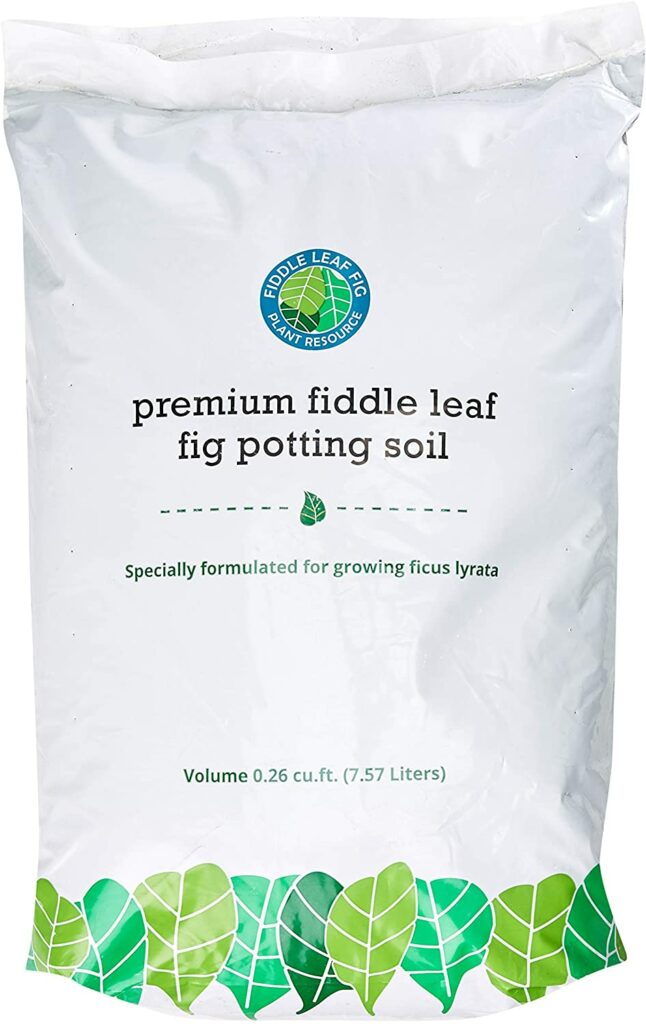
If you’ve been searching about fiddle leaf figs online, you might have come across Premium Fiddle Leaf Fig Tree Potting Soil. It comes from a niche brand that specifically provides products for fiddle leaf care. It is specifically formulated for ficus varieties to ensure the moisture and aeration that they need.
It is derived from the following ingredients:
- IBI-certified Biochar
- Coco coir
- Green compost
- Organic aged bark
- Perlite
The manufacturer claims that this potting soil provides a perfect balance between water retention and drainage. It is designed to help prevent root rot, dropping leaves, and brown spots that are common in fiddle leaf figs.
The Biochar content helps with the retention of nutrients such as nitrogen, phosphorus, and other essential plant food that promotes lush growth in indoor plants.
You may use it for the following plant varieties:
- All ficus varieties
- Rubber plants
- Aroids
- Monstera
Most gardeners who want to start growing fiddle leaf figs find this potting mix convenient to use.
If you have a day job or are busy taking care of kids, this is a ready-to-use mix and all you need to do is fill in the pots. It also comes in resealable packaging for easy storage. The manufacturer claims that it is sterilized to prevent any bugs and bacteria in its product.
The only concern of some gardeners is its size for its price since the packaging is quite small and not full. In some batches, the mix has also been absorbing too much moisture. However, some gardeners find a solution to solve it by adding more perlite to the mix.
Pros
- Specifically made for fiddle leaf figs
- Contains Bio Char to help retain nutrients in the soil
- With Aged bark filter for impurities
- Resealable packaging
- Helps defend against root rot, brown spots, dropping leaves in ficus varieties
- Non-toxic formulation
- Helps revive severely distressed fiddle leaf figs
Cons
- Some batches of this product are reported to hold too much moisture. So, some gardeners add more perlite to balance the soil drainage.
- Too pricey for its size and the bag is not full.
2. Fiddle Leaf Fig Soil by Perfect Plants
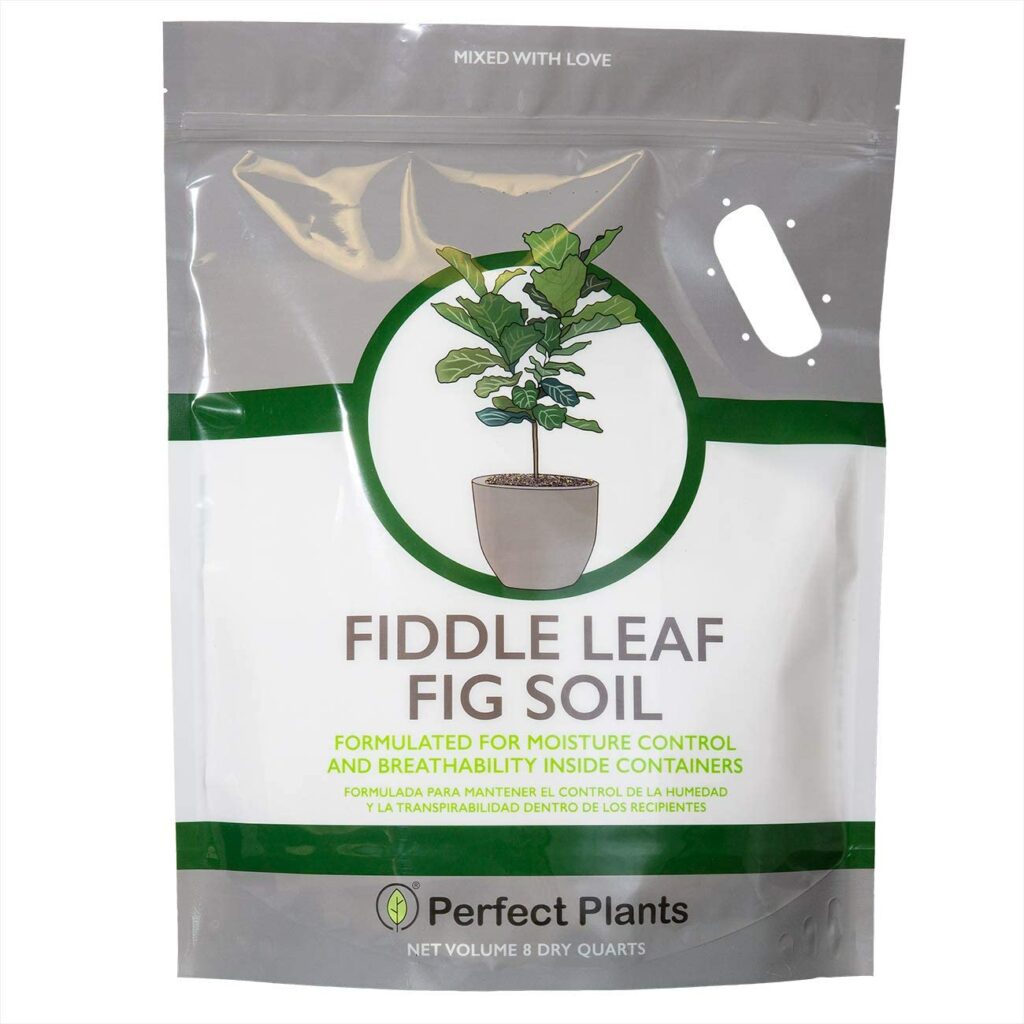
Another popular soil especially made for fiddle leaf figs is from Perfect Plants. It is a pre-mixed formula that aims to provide moisture control and nutrients to fiddle leaf figs.
If you find other fiddle leaf soil mixes expensive, this is a good alternative. It is derived from the following ingredients:
- Shredded coconut coir
- Pine bark
- Perlite
- Slow-release fertilizer
This potting soil uses coco coir to help retain enough moisture and keep the soil damp for the plant’s use. The pine bark chips and perlite help boost the soil drainage, prevent soil compaction, and boost aeration in the soil. Aside from ficus varieties, it is also suitable for indoor plants in containers.
Aside from its well-draining ingredients, it comes with a slow-release fertilizer. So, if you use this potting mix, skip feeding your fiddle leaf fig for at least two months. You may use it on most indoor plants like monstera.
The only concern with this potting mix is the reports about bugs in the bag. The good thing is you can have it replaced by the manufacturer as long as you have the product with you. Don’t throw it so you can have something to prove that you bought the product.
Pros
- Affordable
- Contains slow-release fertilizer
- Well-draining ingredients
- Allows optimal root aeration
- Good for various indoor plants
Cons
- ISome gardeners think that it is not sterilized because of the bugs in the product.
C. DIY Fiddle Leaf Fig Potting Soil
If you want to be a more hands-on plant parent, you can also mix your own potting mix for your fiddle leaf fig.
Though it can be more expensive to mix your own potting mix, it will help you know how to adjust the contents to suit the needs of your plants.
Two recipes are recommended by gardeners. These are as follows:
Mix 1
- 1 part peat moss/coco coir
- 1 part perlite
- 2 parts organic soil
Mix 2
- 1 part gardening soil
- 1 part compost
- 2 parts pine bark
- 1/2 part horticultural active charcoal
Ingredients For DIY Fiddle Leaf Fig Mix
Every component of soil serves a specific purpose. As for fiddle leaf fig soil mix, the components should provide the following roles:
- Retain water to hydrate the plant
- Provide nutrients and enrich the soil
- Help aerate the roots in the soil
- Keep the plant in place
To make the mixing easier for you, we also listed down the best brands for every ingredient that you will need.
Peat Moss
1. Rio Hamza Trading Natural Sphagnum Peat Moss
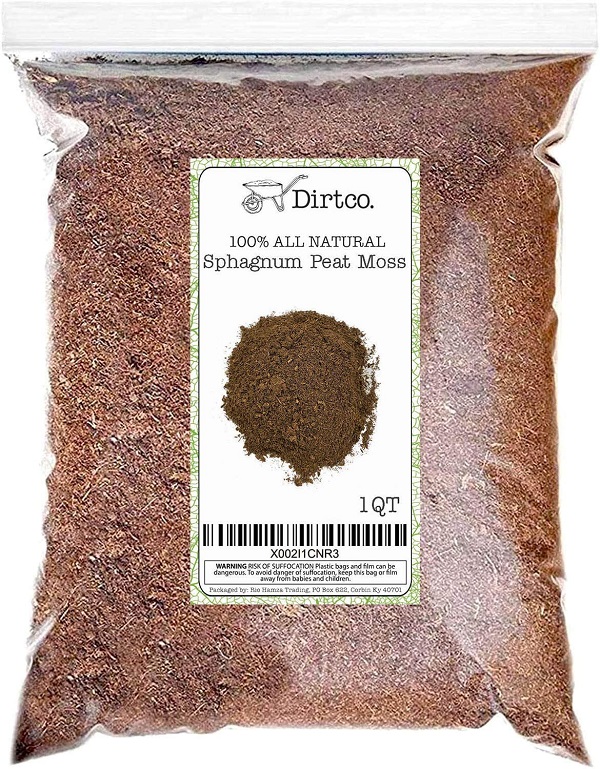
Sphagnum peat moss from Rio Hamza Trading is an all-natural gardening soil that you can use as the base of your potting mix for fiddle leaf figs. It is a soil amendment that does not contain any fertilizer so you no longer need to worry about overfertilizing your plants.
Aside from using it for fiddle leaf fig soil, you may also use it as a base for carnivorous plants and terrarium-style plants.
Many gardeners use it for their plants and achieve great results. However, most of them fail to realize the size of this product and expect it to be as big as its competitors.
It’s about a few inches larger than a hand. So, don’t be misled about its image online.
Pros
- 100% natural sphagnum peat moss
- Raw and no fertilizer added
Cons
- Pricey
- Misleading image size
2. Organic Sphagnum Peat Moss by Perfect Plants
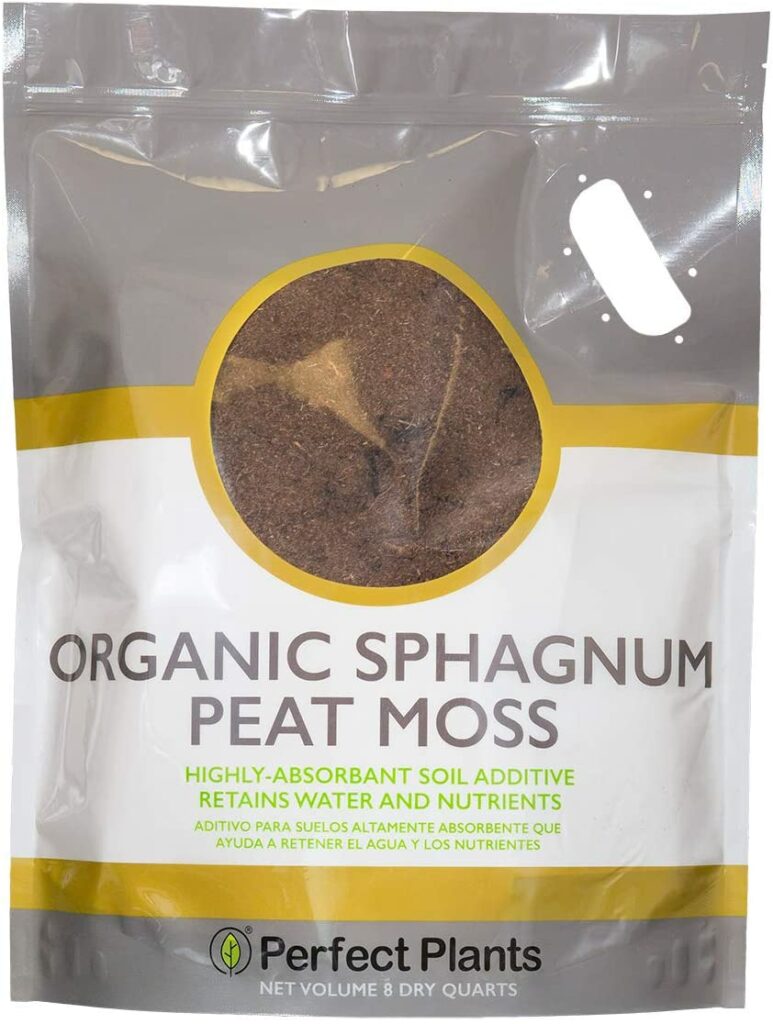
If you are looking for affordable peat moss with good water retention suitable fiddle leaf figs, Organic Sphagnum Peat Moss by Perfect Plants is for you.
Aside from water, it also helps absorb nutrients to help nourish your plants for a longer time. It also contains no additives and fertilizers.
One of the best features of this sphagnum peat moss is it prevents soil compaction and helps the roots grow freely in the soil. It can be used for both indoor and outdoor fiddle leaf figs.
It has a slight acidity, so you need to amend the soil with other ingredients like compost to make the soi environment suitable for fiddle leaf figs. The packaging is ulcer resealable to make it easy to store.
What most gardeners like about this peat moss is its ability to stay dry on the surface but hold enough moisture (damp) to hydrate fiddle leaf figs. It is lightweight and also comes in big sizes compared to its competitors. It is also a gardener’s favorite for being an affordable alternative to most mainstream brands.
The only concern that you may encounter with this product is its acidity levels and potential ammonium content. However, you can always adjust the soil pH by mixing the right soil amendments.
Overall, its performance outweighs its other issues/concerns for most plant parents.
Pros
- Ideal for carnivorous plants and seedlings
- Prevents soil compaction
- Lightweight
- No other additives
- Affordable
- Big bag for its price
- No clumping
- Stays dry on the surface but damp underneath
- Does not form molds
- Works well for ficus varieties and semi-hydroponic setups.
- Resealable packaging
- Sterile potting medium
Cons
- A bit acidic
- Potential ammonium contents
3. Hoffman Canadian Sphagnum Peat Moss
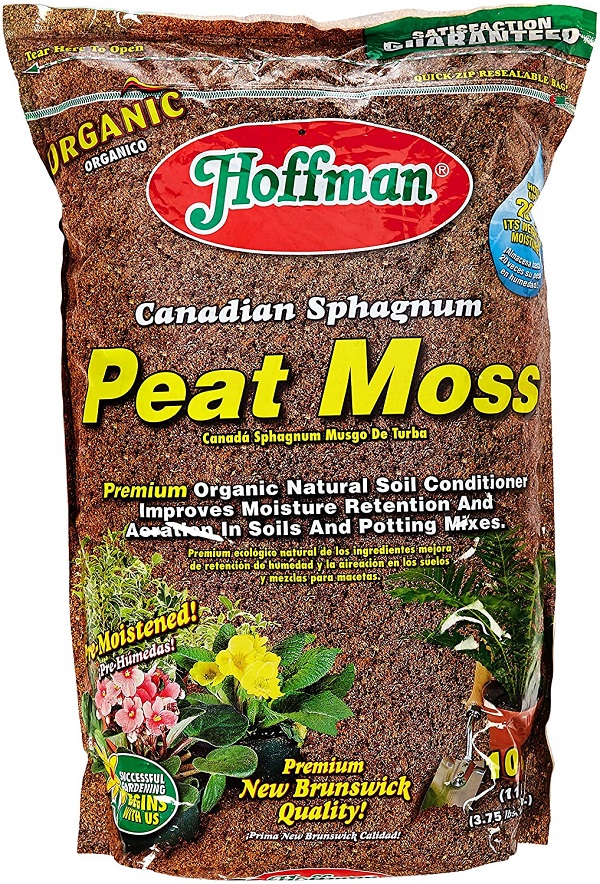
Hoffman Canadian Sphagnum Peat Moss is a 99.8% organic soil amendment that has been a popular go-to brand for most indoor plant gardeners. It is best mixed with perlite for plants that love a soilless mix. It is very versatile since it is also safe for aquarium use.
Pros
- Highly-absorbent
- Big bag and affordable price
- Gardener’s favorite
- Versatile soil amendment
- No additives
- Affordable
- Works well for moisture-sensitive plants life ficus varieties
- No bug issues
Cons
- Acidic
4. Miracle-Gro Sphagnum Peat Moss
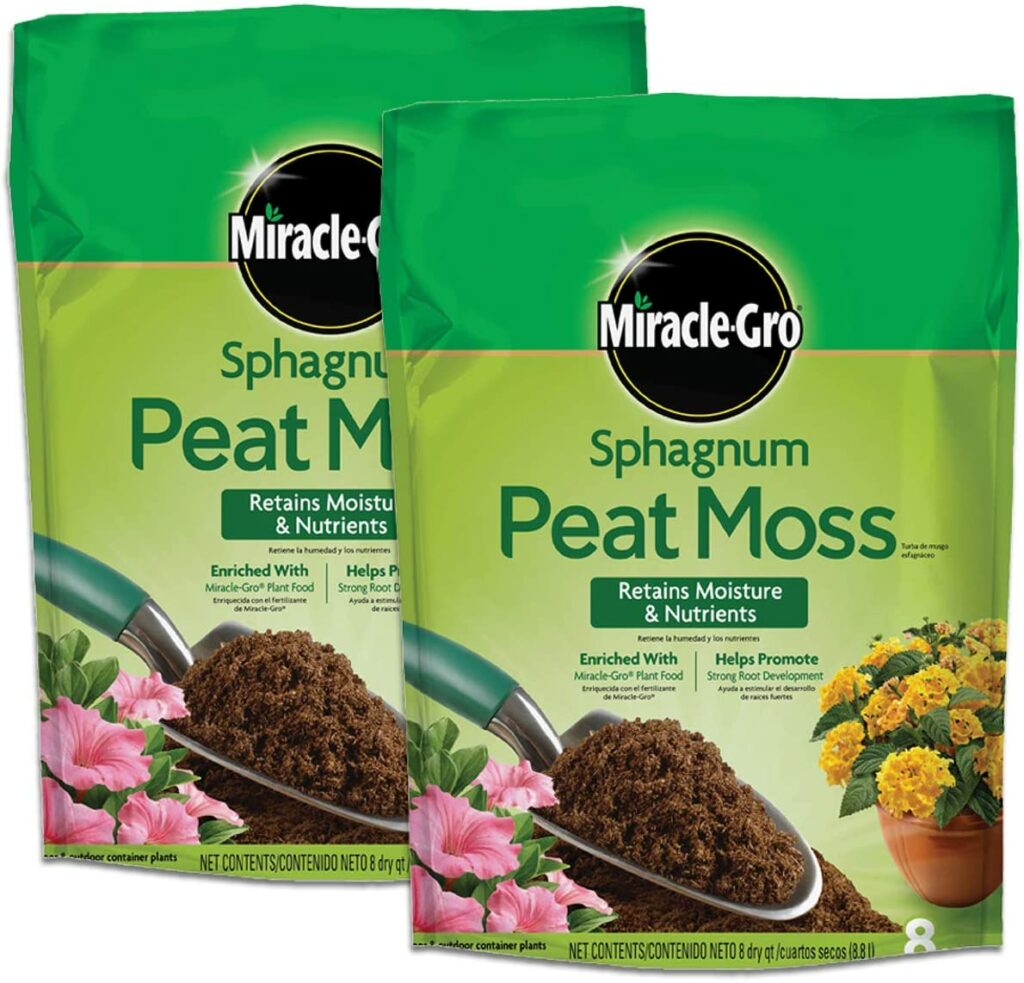
If you’re a fan of Miracle-Gro products, you may also use their sphagnum moss to mix your fiddle leaf fig potting soil. It helps lighten heavy soils especially if you have problems with overwatering and root rot. It is enriched with Miracle-Gro Plant Food to help boost strong root development.
The manufacturer claims that it has unique water-holding capabilities that promote less frequent watering. You may use it for both indoor and in-ground ficus varieties. The formulation is geared towards moisture and nutrient retention to continuously feed and hydrate ficus plants.
It is derived from the following ingredients:
- Peat moss
- Fertilizer
- Wetting agent
Most gardeners love that it comes in a big bag. However, unlike other peat moss varieties, it is not recommended for use in lowering the soil pH. It is also affordable and convenient since you no longer need to buy another fertilizer for the next couple of months.
One of the mistakes that some gardeners make is applying another batch of fertilizers on top of this fertilized peat moss. Such incidents have led many plants to become overfertilized, burn and die.
Pros
- Affordable
- Ideal for indoor and outdoor plants
- A big bag of peat moss
- Resealable packaging
- Comes with fertilizer
- Lightens up the soil and prevents compaction
Cons
- Many gardeners forget that it has fertilizer which can lead to the overfertilization of plants.
Perlite
1. Mother Earth Perlite, Large and Coarse
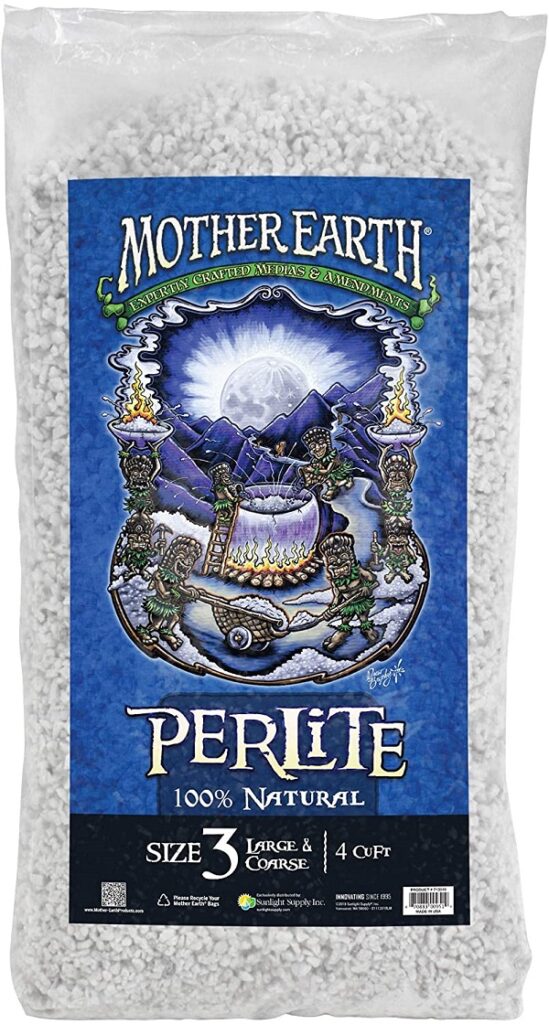
If you have a lot of plants to re-pot and fix, you can get a good deal out of Mother Earth Perlite. It is pH-neutral perlite with an acidity level of 7.0 and stands as a versatile soil amendment that can be used for both soil and Hydroponic Use.
It spans 3 feet and 15 inches wide and can cover about 4 cubic feet of soil. It comes in two sizes where #3 has ½-inch perlite and #4 for the large ones with a size of an inch.
Mother Earth Perlite is a natural siliceous rock that can expand up to 20 times its original volume when placed under heat up to 1600° F. It is added in potted fiddle leaf figs to boost soil drainage and add porosity to the soil.
Unlike peat moss and coco coir, it has no additives or coatings and does not need sterilization.
The texture of this perlite is spongy and very light. What most gardeners love about this brand is its affordable price for its size. The bag is huge and can cover your re-potting needs for almost a year. It is also a good deal if you have a big garden since a bag is huge enough to cover a huge space.
Some concern about this product is it’s dusty, which is natural to perlite products. They may crumble due to shipment and storage conditions. Many gardeners recommend using a well-fitting face mask to avoid inhaling the powdered residue of perlite.
Pros
- Affordable
- Big and full bag
- High-quality perlite
- Comes in two sizes
Cons
- Dusty
- Requires face mask when adding the perlite into the soil
2. xGarden 8 Quarts Horticultural Grade Premium Perlite
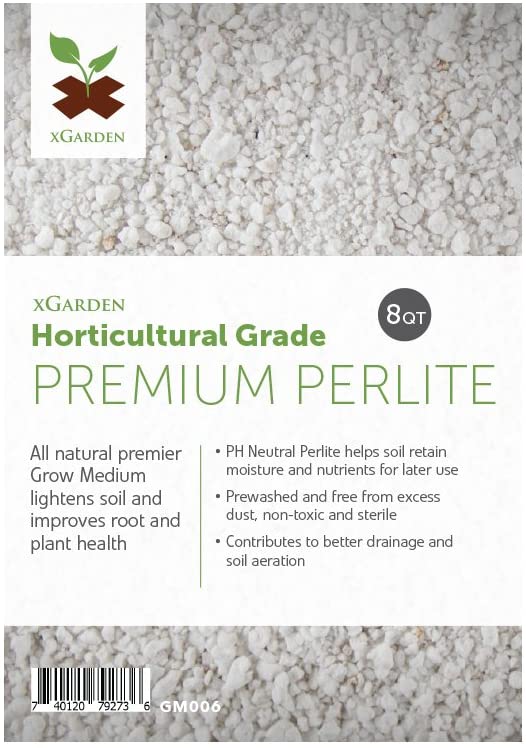
xGarden Horticultural Grade Perlite is a premium soil amendment that helps lighten the soil and prevent compaction. It comes in an 8-quart bag which is equivalent to 8 cups of perlite. It is non-tox and has a neutral pH level. The manufacturer also mentions that it is sterile and free from any growing insects and bacteria.
This brand of perlite has a coarse and chunky texture but comes in a small size. So, if you’re looking for 1-inch perlite content, this may not be the brand for you. With its size, it’s more suitable for small ficus varieties, succulents, desert, and jungle cacti.
What most gardeners like about this brand is its chunky and clean texture. It is also versatile for soil and soilless mixes.
However, it is too small for some farmers and the packaging is also not resealable. It is suitable for one-time re-potting use for small plants.
Pros
- Clean and chunky texture
- Versatile soil amendment
- Non-toxic
- Sterile
- Promotes moisture and nutrient retention
- Ideal for small ficus and cactus plants.
Cons
- Some batches contain crumbled perlite
- Cheap packaging (non-resealable)
3. Miracle-Gro Perlite
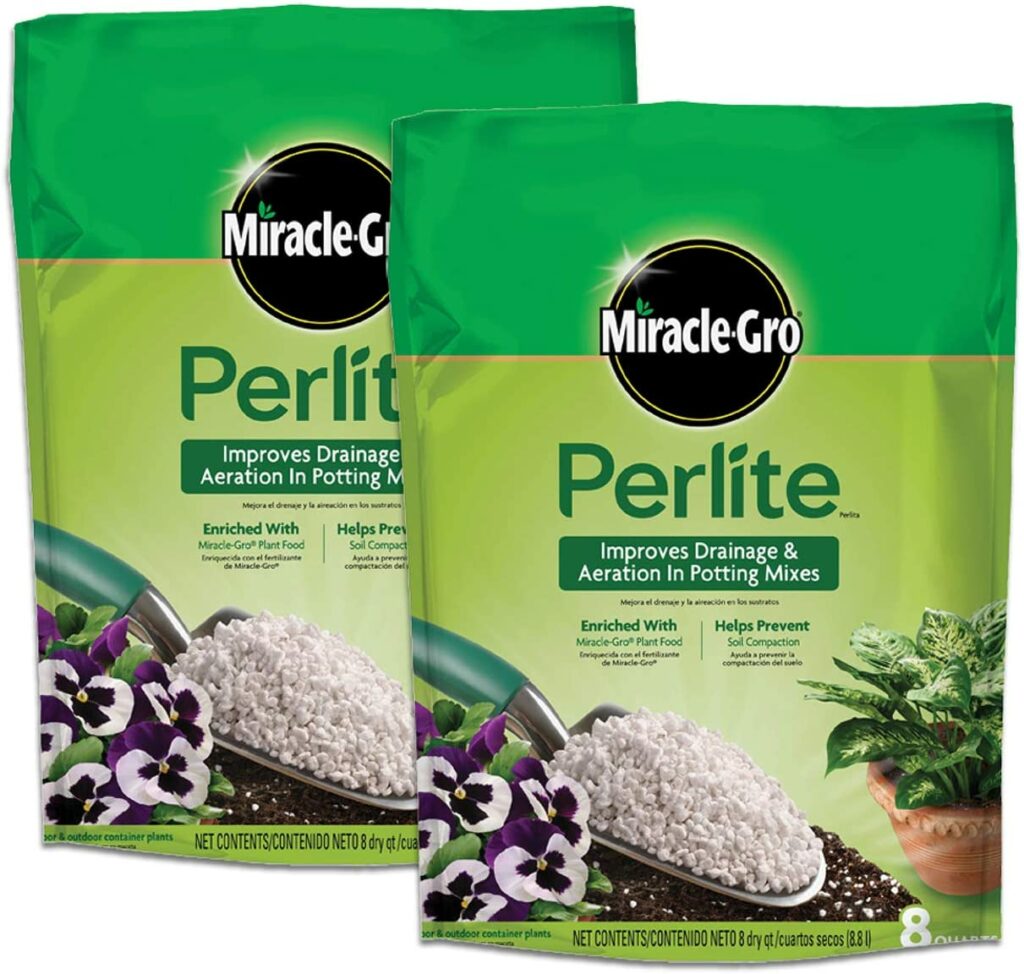
Our list will never be complete without some Miracle-Gro. Though some gardeners despise their fertilizer products, they still find a good deal with the brand’s soil amendment line. Miracle-Gro Perlite is among the few perlite brands that have plant food.
This brand is lightweight and helps prevent soil compaction as well as root development.
It promotes proper aeration for soil mixes prepared for moisture-sensitive plants like fiddle leaf figs. However, unlike its competitors, it is only suited for container use.
The strong point of this brand is its adequate size for its price. It’s affordable for most gardeners and they also save from its fertilizer content.
However, like other brands, they also have powdered and crumbled perlite issues which is a dissatisfaction to some gardeners. Some of them also noticed that the crumbled perlite floats as soon as they water their plants.
Pros
- Affordable
- Same as advertised
- Enriched with Miracle-Gro plant food
- Ideal for container use.
Cons
- Concerns about crumbled or powdered perlite like other brands
- Potential over-fertilization plant issues for unaware gardeners about its plant food content
Coco Coir
1. SpongEase Pro Coco Coir Brick
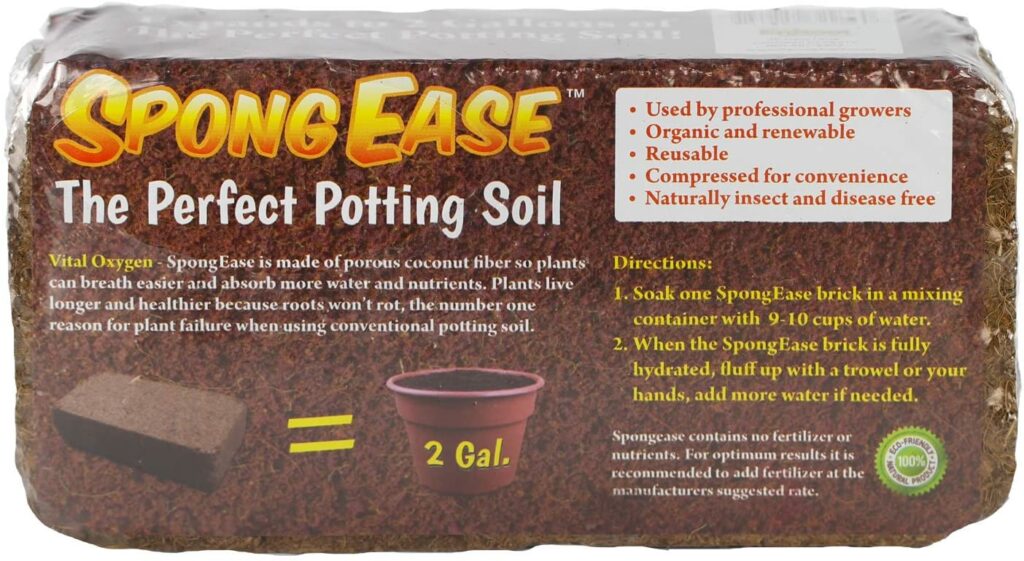
Another alternative for peat moss is coco coir. It is a lightweight soil amendment that helps add volume to the soil and keep the anchorage of the plant.
SpongEase Pro Coco Coir Brick is an expandable coco coir brand that expands into two gallons as soon as you rehydrate it. Its texture is like a sponge that helps retain moisture without drowning the roots of your fiddle leaf figs.
The natural fibers of coco coir help increase oxygen in the soil and prevent overwatering issues.
If you’re having several issues with root rot among fiddle leaf figs, this medium might be a good alternative. It is peat-free and reusable for your other plant growing needs.
This coco coir brick needs lukewarm water for rapid expansion. It is made from the fibers of coconut husks and has been compressed for easy storage and shipping. If you’re in your senior years, this brick coco coir also eases the heavy lifting.
Many gardeners are amazed by how much it expands after rehydrating the brick with water. Coco coir is also a versatile potting media that can be used not only for fiddle leaf figs but also for all types of plants, such as:
- Vegetables
- Fruits
- Berries
- Landscape plants
- Roses
Coconut fiber, in general, can absorb up to 10 times its weight in water and comes with a neutral pH. It’s naturally acidic, but as you mix it with perlite and other soil amendments, you will get the right pH balance that can help the roots absorb nutrients from the soil.
Most gardeners who are concerned about the environmental background of gardening products find coco coir an environment-friendly alternative to peat moss. It is renewable and not produced from mining practices and reusable for a long period.
The only concern about this brand is when it is overwatered, molds may start to develop.
Pros
- Easy to use and convenient to store and carry
- Expands 10 times its size
- Organic and renewable
- Reusable
- Contains no fertilizer
- Eco-friendly
- Smells great
Cons
- Acidic (can be adjusted through other pH-neutral soil amendments)
- Overwatering can lead to molds
2. Kempf Compressed Coco Coir Pith Block
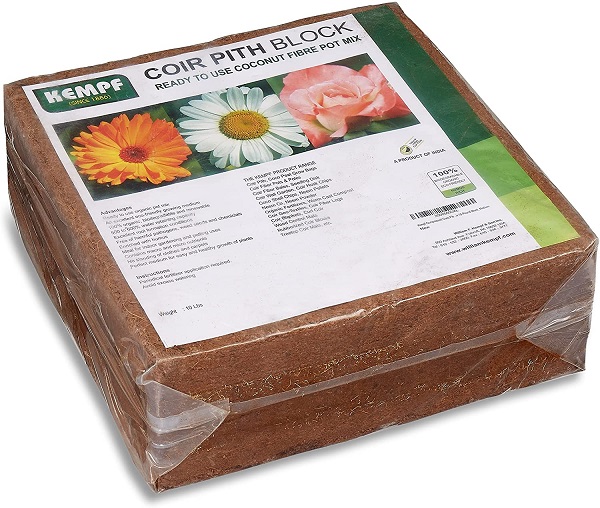
Another popular compressed coco coir brand is from Kempf. It is a 10-pound compressed coco coir pith block that expands to 17 gallons when rehydrated with water. It is ideal for gardeners who need to prepare the soil for several plants or those with huge gardens.
This brand has high water and nutrient retention and can absorb about 8 times its weight in water.
When compressed, it weighs around 8.8 lbs (4kg) which is a bit heavy for the elderly and young kids. However, it can provide your re-potting needs for a large garden from a single block.
The manufacturer claims that it is 100% organic and eco-friendly since it is derived from natural sources. It is ideal for worm beds and potting mixes. They also claim that it is mildew-resistant and helps repel bugs.
Many gardeners also experience good germination and rapid growth in their plants using this coco coir.
They also love how much volume it produces even with a single cup of a compressed block. Afterwhich, they enjoy the nice, fine, and rich coco coir, ready to be used for gardening.
Pros
- Ideal for repotting many plants or soil prep for big gardens
- Highly-expandable and provides 17 gallons of coco coir pith
- Fine and rich coco coir texture
- Eco-friendly
- No additives
- Mildew-resistant
- Ideal for worm beds and potting mixes
Cons
- A bit heavier than its competitors (weighs 8.8 lbs)
3. Plantonix Coco Coir Brick
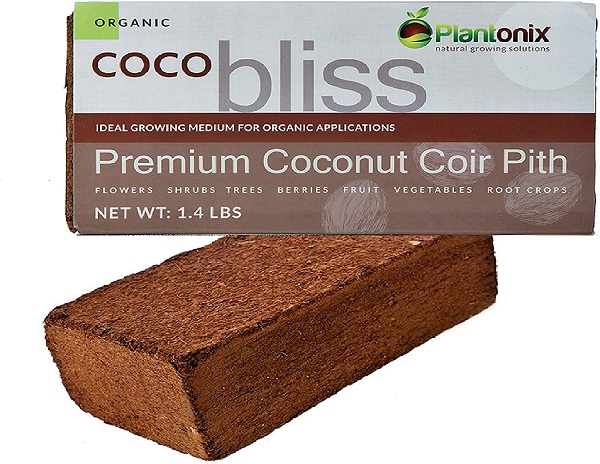
If you’re looking for certified organic coco coir, you can have Plantonix Coco Coir Brick. It is one of the few coco coir brands listed by OMRI as 100% natural and organic. Each brick weighs around 1.4 lbs and comes in a pack of five. It expands up to 40 to 42 liters of coco coir.
This brand is high-grade coconut coir with low EC and pH levels. It also has a very low salt content and has a pH level range of 5.8 to 6.8. It holds a moisture percentage of 10% to 15%. It also has a high cation exchange capacity (CEC) and is processed in freshwater.
It is a good replacement for:
- Peat moss
- Rockwool
- Perlite
Plantonix Coco Bliss is also free from dirt, fertilizer, and weed seeds. It also breaks down slowly and does not shrink during a full growing cycle.
Aside from potting mix for fiddle leaf fig, you may also use it for the following:
- Hydroponics growing medium
- Seedling nurseries
- Horticulture and floriculture applications
- Outdoor home gardening
- Landscaping
- Amending clay soils
- Worm bedding
Aside from its OMRI certification, gardeners Appreciate its size since it is easier to break down into smaller chunks. It also rehydrates efficiently and produces even and fine consistency. It’s also clean from any fruit flies and other soil-borne bacteria.
Pros
- OMRI listed
- Expands into 42 liters of coco coir pith
- Very low EC levels and salt content
- pH neutral
- High cation exchange capacity (CEC)
- Processed in freshwater
- Versatile soil amendment
- No Trichoderma
- Easy and convenient to use
Cons
- Inconsistent brick sizes
- Poor packaging
Other Soil Amendments For Fiddle Leaf Fig Potting Mix
We have listed the main contents of the DIY potting mix for ficus varieties above. For complete potting soil preparation, here are the other things you need to add:
(1) Compost: Compost helps nourish the soil microbiome, increase nitrogen, and neutralize the soil pH level.
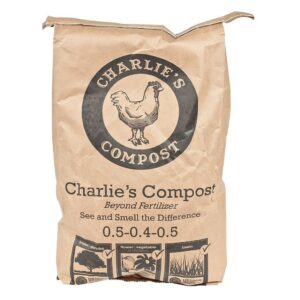
If you’re running a bit impatient about creating your compost, you may buy a ready-to-use one like Charlie’s Compost 10lb.
(2) Pine bark: Wood barks like pine bark help add organic matters to the soil and boost soil drainage. You may buy it from your local gardening stores or buy it from Rio Hamza Trading.
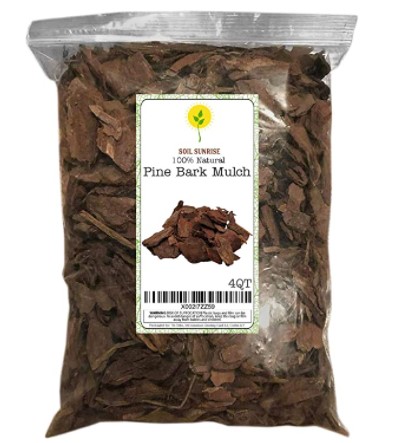
(3) Activated charcoal: Horticultural activated charcoal helps sweeten the soil or decrease its acidity level and remove excess moisture.
Horticultural Charcoal by Perfect Plants is one of the best ones you can try for your Ficus plants.
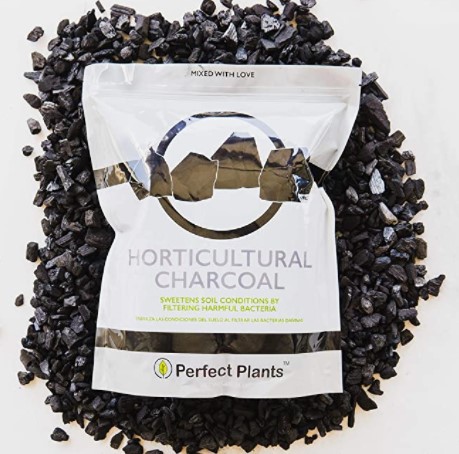
Final Thoughts
The best soil for fiddle leaf figs is well-draining and lightweight soil with a pH level between 5.5 to 7.0. You can either buy a ready-to-use mix or mix your own using different soil amendments.
Make sure to check information about the fertilizer content and pH level of the potting medium that you will use to prevent burning your plants due to overfertilization.
We hope that this post helped you find out how to find the best soil for your ficus plants. If you find this post informative, don’t forget to share it with your friends and help them with their gardening issues too.
Let us know in the comments which DIY potting mix worked best for your fiddle leaf figs!
